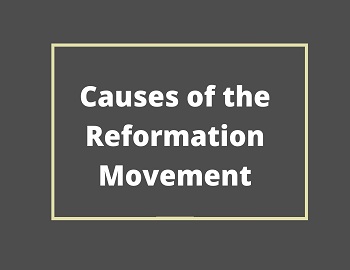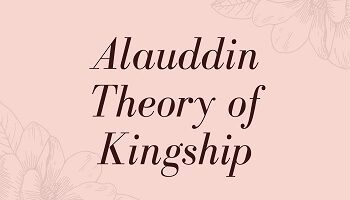Table of Contents
Reformation Movement:
Meaning of Reformation:
The term Reformation refers to a great religious reform movement in Europe during the 16th century. There was a big protest against the Christian Church in different parts of Europe and it ultimately resulted in the emergence of the Protestant Christian religion. This great religious movement was not only the evidence of a great religious change but also proclaimed the dawn of a new era. The Reformation started in Germany and later spread to other countries.
Scheville throwing light on the meaning of this movement writes, “It was, in fact, a dual movement having for its objects the renovation of the moral life of Christendom and the repudiation of the papal claims to ecclesiastical supremacy.”
According to Warner and Martin, “The Reformation was a moral revolt against the Papal grossness and corruption.”
The great historian Hayes states, “In fact, in the beginning of the 16th century, the majority of Christians under the force of prudence condemned the Catholic Church vigorously and wished to reform thoroughly. The religious movement which occurred in the wake of this reformative drive and the new religious sects formed out of the disruptive Christianity- all these events collectively constitute the reformation movement.”
Causes of the Reformation Movement:
The conditions that led to the Reformation had existed for hundreds of years. There were several instances of injustice practised by the Church. Yet, it was difficult to openly criticise or defy its teachings. The discontentment against the Church finally manifested itself in the Ninety-Five Theses, written by Martin Luther in 1517. Some of the major reasons that led to the movement are discussed below.
(1) Scientific Progress- The scientific Greek ideas regarding the world and God emerged from the Renaissance in the 14th and 15th centuries and obliterated the doctrines of the Church. For example, Ptolemy held that the earth is the centre of the solar system. This belief was so inveterate that Bruno was burnt alive when he disapproved of Ptolemy’s theory. When Copernicus proved that the earth rotates around the sun, he was pressed by the priests to revoke his theory. At the same time the learned thinkers postulated, contrary to the religious belief, that man can become the maker of his own destiny. Due to the invention of the mariner compass, the Europeans came in contact with different non-Christian cultures. Consequently, religious ostentation was exposed.
(2) Diffusion of Education- Before the 15th century, only religious education was imparted in European education centres. But as a result of the Renaissance, the subjects of humanities were studied in Italy and many other parts of Europe. The diffusion of non-religious education enabled people to see through the evils of Christianity. The introduction of the printing press contributed immensely to the diffusion of non-religious education. In a short period of 50 years, about a million books were published. The circulation of books disseminated special knowledge and new thoughts. Even ordinary people learnt the fundamentals of Christianity because the Bible had been translated into many foreign languages. In several European states like Germany, France and England, new universities were founded which at a later stage, became the centres of activities of the leaders of the Reformation.
(3) Renaissance- The Renaissance movement created a spirit of inquiry among the masses. They began to read the Bible and realized that the activities of the Church and the clergy were not according to the precepts of the holy book. In the years preceding the Reformation, many writers condemned luxurious and superstitious practices prevalent in the Church. John Wycliffe (1330-1384) from England criticized the Pope for his authority and misdeeds. He translated the Bible into English. He is considered “the Morning Star of the Reformation”. Erasmus (1466-1536) attacked the superstitions followed by the clergy in his book “In Praise of Folly”. It was published in 1509. John Huss (1369-1415), a Bohemian, struggled for reforming the Church. But he was condemned for his writings against the Church and burnt to death. These early efforts to reform the Church sowed the seeds for the Reformation of the 16th century.
(4) Economic Reasons- The Roman Catholic Church had amassed huge wealth by the end of the 15th century because every Christian used to pay one-tenth of his income to the Church in the form of Tithe. Besides, the priests used to get enough money for the performance of religious rites, and as offerings and gifts. The Pope and the priests also imposed some taxes on the general masses for their own selfish ends. Appointments for clerical posts were made on the basis of bargaining and the highest bidder was given the post. Too much wealth had created a lot of corruption among the clergy. Comparatively, the people and rulers of the Modern era needed more wealth than those of the Medieval age. Hence they began to criticise and condemn the authorities of the Church. They wished that the accumulated wealth in the Churches should be spent for the good of the general masses but the clerics were altogether against it and they did not discharge their religious duties properly. Hence the Reformation Movement spread in Europe.
(5) Demerits of the Church- The Church in Europe had grown into a formal institution with the Popes wielding extensive power over the Christian nations. The officials in all ranks of the hierarchy had turned the Church into an institution full of greed, immorality and ignorance. Political power, material possessions and privileged position in public life were often the chief aims of many of the higher clergy. Though they preached the virtues of modesty and chastity, they themselves indulged in worldly pleasures. The Popes and Bishops behaved more like kings and prices rather than the religious and spiritual guides. By the 16th century, the Church had acquired immense wealth and land property. Because of its immense influence, the Church was also exempted from paying taxes. Instead, the Church used to collect taxes like the Tithe (1/10 of the income) and Peter’s pence from the common man. These traditional forms of extracting revenue were now used in exaggerated and intensified forms, which created bitter hostility and provided the immediate background of the Reformation. To earn more revenue, the Church officials indulged in several corrupt practices i.e. Simony (buying and selling of high offices), Sale of indulgences (granting pardons for any sin committed in lieu of money), Sale of dispensation (the practice of paying money to get exempted from following the church rules and laws). All these practices lowered the value of the Church traditions. It created an impression on the people that instead of serving penance for their sins, they could easily pay the Church and buy pardons or exemptions from the canon law. It was perhaps the sale of indulgences that led Martin Luther to start questioning these corrupt practices of the Church.
(6) Political Causes- Pope’s political influence and a keen desire among kings for freedom from it are also responsible for reformation. In the medieval period, the Pope was invested with extensive political rights. For example, he intervened in the internal as well as external affairs of the states affiliated with the Roman Catholic Church; he had the right to expel the king from religion; he had the right to elect prelates and order the public to revolt against the state. But the condition had changed at the beginning of the 16th century. Kings established their autocracy by way of suppressing the feudal barons. Nation-states were established in certain parts of Europe. All this consolidated the position of kings. In these circumstances, it was natural for the kings to challenge the intervention of the Pope. Every ruler wanted to establish law courts and levy taxes in accordance with the national norms. On the contrary, the Pope preferred international norms in the matter of regulating the laws of the Church, the administration of courts, and the collection of taxes. The rulers took it as an infringement of their rights. They wanted that the cases against all the defaulters including the papacy should be filed in the national courts. The rulers wished for absolute sovereignty. So they nurtured bitterness against the Pope.









Comments (No)